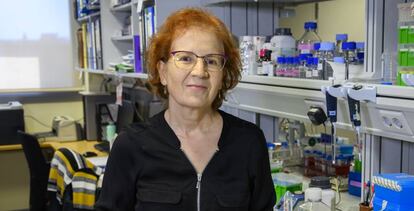Spanish Covid-19 expert: ‘There is more virus circulating now than before the state of alarm’
Margarita del Val, who heads a cross-disciplinary scientific research effort to fight the coronavirus pandemic, offers her views on the possibility of a second wave in Spain, and what to do about it


Margarita del Val, a Spanish virologist and immunologist, is coordinating a cross-disciplinary initiative by the Spanish National Research Council (CSIC) named Salud Global/Global Health, which encompasses around 200 research groups working on a global approach to the Covid-19 pandemic, from prevention and detection to communication.
Del Val, a native of Madrid, says that the best part about the comprehensive initiative is the fact that experts from various fields are exchanging ideas and helping resolve issues with “international cooperation that’s never been seen before.”
But this expert also warns that a pandemic is, by its very nature, unpredictable, and that mathematical models are subject to society’s own reaction to the disease. “A society’s capacity for action is extremely powerful,” she says. “If we had chosen not to confine ourselves, the pandemic would have been explosive. But if we keep going like this, there might not be a second wave. It’s up to us.”
The following is an abridged version of the original interview in Spanish.
Question. New outbreaks in China have led authorities there to confine the citizens of certain neighborhoods in Beijing. Will there be a second wave in Spain?
Answer. Iran is experiencing a second wave right now and it is nearly as bad as the first one, which was already intense. The virus emerged in China, and one of the first countries to be affected was Iran. After that came Italy and Spain, and then we forgot about the rest of the world. Singapore has already been through three small waves.
Q. So there could be a second wave with the warmer weather?
A. Yes. Iran is an example. Beijing now has an outbreak, and because they take drastic measures, they’ve decided to effect closures. In [the Basque city of] Bilbao, where there are also significant outbreaks tied to hospitals, they could have made a decision to close as well, but the strategy there is different. Yet the risk clearly exists. It is up to us to ensure that the outbreaks do not become a second wave. It could happen at any moment.
It is up to us to ensure that the outbreaks do not become a second wave. It could happen at any moment
Q. The previous pandemic, dating back to 2009 and involving influenza A or swine flu, had two waves.
A. In Madrid there was a first wave between early July and early August. Then there was a worse one that began in the fall. It is a different disease, but also a respiratory one, with similar incubation periods. And there was a second wave. In July, a large amount of the population had no immunity or very slight immunity, especially those under 50. There were so many people who could catch it that a wave began in the summer, when the virus found a lot of hosts to infect. This time around, in Spain, we have a lot more people likely to catch the virus than before. With the flu, people over 50 had some degree of cell immunity. But right now, 95% of the Spanish population is susceptible to the coronavirus. That is a lot of tinder.
Q. How much of the virus is currently in circulation?
A. There is a lot of virus in circulation, more than before the state of alarm [declared on March 14]. It is difficult to provide an estimate, but there is more of it now. Let’s see if the [Health] Ministry stabilizes its figures so we can compare them with the earlier ones. There are more outbreaks now. All the people who are about to undergo surgery now after postponing it for three months – and who haven’t died already for failing to get surgery or medical assistance, in what is known as collateral deaths – are getting PCR tests. And these are detecting that completely asymptomatic people are positive for coronavirus, and they represent a significant number of people who can pass on the disease.
Q. What is preventing us from being in the middle of a new wave?
A. The fact that most people are wearing face masks, that many still haven’t gone back to work, that social distancing is being observed, that we are being careful... If it wasn’t for that, it would be here already.
Stopping a wave requires several measures: closing schools, confinement, masks, limited access to parks. Just one doesn’t work
Q. Iran opened its mosques, which may explain the new outbreak. Experts are insisting on avoiding closed spaces.
A. It is important to make outbreaks public so we can properly understand what kind of situations are dangerous. Now that major outbreaks have been analyzed, we know they took place at healthcare centers or senior centers, places with a lot of contact and very vulnerable people, and in closed places: restaurants, bars, workplaces, concerts, choir practice – which takes place indoors and involves heavy breathing –, gyms, religious ceremonies... Another key factor is spending a lot of time near an infected person.
Q. Now that we know more about airborne transmission, what’s the recommendation for the population?
A. Wearing a face mask. At first they were being recommended in Asia, but we didn’t believe there was a need because they didn’t back it up with data. We have had a somewhat cavalier attitude towards anything coming out of Asia, and I think this has been a lesson in humility. As a hyper-skeptical scientist myself, I had my own doubts due to the lack of data. Stopping a wave requires several measures: closing schools, confinement, masks, limited access to parks. Just one doesn’t work. We still don’t know which one is the most important. We know the problem is the accumulated air, it’s not enough for an infected person to simply walk by you.
Q. How should we prepare for a second wave?
A. In my view, with a cellphone app. The problem with contact tracing is that you might remember a lot of people you were in touch with, but how do you find those people? And let’s not even mention public transportation in big cities. We give information to Facebook, which has vast amounts of data on each one of us, or every time we do a search on Google. There should be an application and remote working should be extended: flexible schedules, flexible days.
Q. What if that second wave coincides with seasonal flu?
A. That would be terrible, because the symptoms overlap. More diagnoses will be necessary, everyone with respiratory symptoms will have to be tested for coronavirus. And in the fall and winter, that’s a good chunk of the population.
Q. Are there enough labs to take on that workload?
A. No. But at the CSIC we are getting ready to do so. We’ve been doing so since March, since the beginning of the confinement, but we never received any samples.
Q. Many research labs offered to do PCR tests. Are you frustrated that you were not able to help make diagnoses during the peak of the pandemic?
A. We offered researchers, alternative reagents from those being used at hospitals so we would not compete with them, with perfect sample tracing methods... It could have been done in many places, but it wasn’t. So yes, we are frustrated and yes, also angry. Especially after seeing what happened in Madrid’s senior homes, where tests were not carried out in many cases. Those who did [carry out tests] isolated the positive cases, and transmission was avoided, and deaths. The key was diagnosis, and we have been offering it, but it has not been accepted.
English version by Susana Urra.
Tu suscripción se está usando en otro dispositivo
¿Quieres añadir otro usuario a tu suscripción?
Si continúas leyendo en este dispositivo, no se podrá leer en el otro.
FlechaTu suscripción se está usando en otro dispositivo y solo puedes acceder a EL PAÍS desde un dispositivo a la vez.
Si quieres compartir tu cuenta, cambia tu suscripción a la modalidad Premium, así podrás añadir otro usuario. Cada uno accederá con su propia cuenta de email, lo que os permitirá personalizar vuestra experiencia en EL PAÍS.
¿Tienes una suscripción de empresa? Accede aquí para contratar más cuentas.
En el caso de no saber quién está usando tu cuenta, te recomendamos cambiar tu contraseña aquí.
Si decides continuar compartiendo tu cuenta, este mensaje se mostrará en tu dispositivo y en el de la otra persona que está usando tu cuenta de forma indefinida, afectando a tu experiencia de lectura. Puedes consultar aquí los términos y condiciones de la suscripción digital.








































